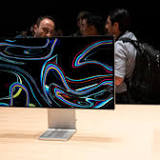Flying coach? At least you'll be able to watch movies on an in-seat OLED TV soon

-
This is one of the Panasonic Avionics Astrova in-flight entertainment systems, set to debut in Icelandair, Qantus, and United Airlines flights in the next couple of years.Panasonic
-
The goal doesn't seem to be to keep them in first class; economy seats will get them too, albeit in smaller sizes.Panasonic
Flying on commercial airlines today might be a lot more of a pain than it used to be, but new tech is going to bring some improvement to one part of the experience—in-flight entertainment. Panasonic Avionics' brand Astrova in-flight entertainment systems are starting to roll out on commercial flights on certain airlines, promising 4K HDR TVs and other features to the backs of seats that should be a huge upgrade over the abysmal screens we normally watch in-flight movies on.
Look at most commercial airlines today, and you'll find a tiny, terrible LCD TV embedded in the seat in front of you. These HD, standard dynamic range screens have terrible contrast and poor viewing angles, and they aren't bright enough to achieve a good viewing experience when the overhead lights are on.
They're bad enough that I always bring my own hardware for flights—most recently, I took three flights with Apple's Vision Pro headset, which I plan to write about later this week. But most people just bring a tablet.Astrova is Panasonic's name for an in-flight entertainment system that aims to improve things dramatically. The OLED screens have 4K resolution and support HDR+. They also have two USB-C charging ports built in that can charge at up to 100 W, and they support Bluetooth, so you can use AirPods or Sony's popular WH-1000 over-ear headphones.
With current systems, you have to bring an adapter to make that happen, if it's possible.
Panasonic has paired the screens with new colored LED lighting systems that aim to make it so the bright overhead cabin lights don't have to come on, washing out the image.
The screens come in 13-, 16-, 19-, 22-, 27-, 32-, and 42-inch variants. "How would you fit a 42-inch screen in an airplane seat?" you might ask. Well, that size is likely for ultra-high-end international flights where people can pay thousands and thousands of dollars for private cabins. Those aren't the only types of seats that will get some kind of Astrova OLED system, though.
The rollout begins this year with Icelandair and Qantas planning to install Astrova systems in 2025 and late 2024. Icelandair will be first; new Airbus A321neo LR craft will see 16-inch screens in business class and 13-inch ones in economy. Qantas will install Astrova as part of its retrofit of its A330-200 fleet of planes and in newly ordered A350-1000 craft. The emphasis for Qantas is on long-haul flights, specifically those between Australia and Europe or the United States.
Last summer, US-based United Airlines announced many of its longer international flights would see these systems installed in 2025, with some domestic flights to follow, so it won't be limited to intercontinental flights.
It's unknown whether these screens will hold a candle to the latest high-end OLED TVs from LG and Samsung, and it looks like it will be a few years before they're widespread in domestic flights. But any improvement is welcome on the terrible in-flight entertainment systems we're using now. Now, if only another company could invent some way to use new tech to make the seats 20 percent bigger—I can dream, anyway.
Listing image by Panasonic


 Australia
Australia Argentina
Argentina  Austria
Austria  Brazil
Brazil  Canada
Canada  Germany
Germany  Ireland
Ireland  Italy
Italy  Malaysia
Malaysia  Mexico
Mexico  New Zealand
New Zealand  Poland
Poland  South Africa
South Africa  United Kingdom
United Kingdom  United States
United States 

























